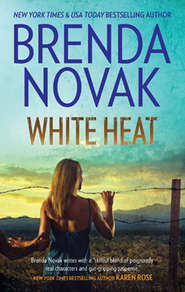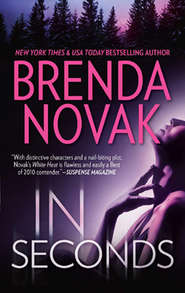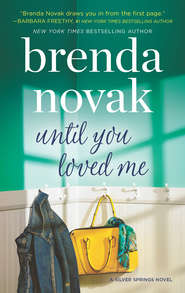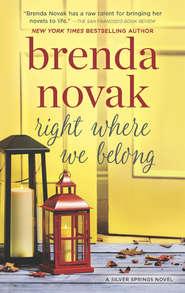По всем вопросам обращайтесь на: info@litportal.ru
(©) 2003-2025.
✖
Home to Whiskey Creek
Автор
Год написания книги
2019
Настройки чтения
Размер шрифта
Высота строк
Поля
Her eyelids rested against her cheeks. If he had his guess, her head was pounding like a jackhammer, but she didn’t complain. “Since Saturday.”
“I mean...before that.”
“I was born in Whiskey Creek.”
“Then we’d be more familiar with each other, wouldn’t we?”
“Not necessarily.”
“I know most people in town pretty well, especially those close to my age.”
“You were caught up in your own life.”
There was a slight undercurrent as she spoke, but it was subtle enough that he couldn’t call her on it. In any case, he wasn’t convinced he’d been any more self-absorbed than other teenagers. “In what way?”
“Never mind.”
“Are we talking about when I was ten or fifteen or...twenty? ‘Caught up’ at twenty being the least flattering, of course,” he added with a chuckle.
A muscle jumped in her cheek. Then she sighed and opened her eyes, as if she was about to give him all the facts about her background at once so he’d leave her alone. “I spent my summers with Milly until eighth grade,” she recited in clipped syllables. “Then, when my mother left for Germany to be with her—what was it then, third?—husband I stayed with Gran.”
He skipped over the number of marriages, figured it wouldn’t be wise to comment on that, not when he was trying to put her at ease. “She married a German? How’d that happen? I’m guessing this was before online dating.”
At this, she actually smiled. “It was. They met via a dating service. He’s American. After dating here, they married. Then he accepted a contract with the military for some consulting work and that required him to live in Frankfurt. She wanted to tour Europe.”
“What about your father?”
“He died in a motorcycle accident before I was born.”
“I’m sorry.”
“He was racing when he died. He and my mother weren’t married. I don’t get the impression he would’ve been a big part of my life if he’d lived.”
He veered away from that subject, too. “So we were teenagers during the period you were referring to?” He grinned at her. “At least that’s younger than twenty.”
She didn’t hurry to reassure him that she hadn’t meant anything negative by her earlier statement. And he noticed the slight, couldn’t help wondering if it was intentional.
“Yes,” she said. “I lived with her until I graduated from high school.”
He found it odd that a mother would give up her child to tour Europe, but he didn’t want to probe what could be a sensitive subject. He was more interested in figuring out why he didn’t remember her, and why she was so...prickly. He’d never encountered anyone determined to dislike him right from the get-go. He might’ve thought he’d slept with her and never called, but he hadn’t done anything like that until college. In trying to cope with the pain of losing Cody, he’d done what he could to distract himself, and sex had been a more effective distraction than any of his other options. “Which would mean we went to Eureka High together for what...two years?”
“You were a junior when I first noticed you.”
She seemed to remember him distinctly, which made him slightly uncomfortable. Was it possible that she’d had a crush on him? Was that what she held against him—some unrequited love thing? Unlike his brother, he hadn’t been interested in girls until he’d started at San Diego State. “Was it on the baseball diamond?”
“It was in the halls, but I saw you on the diamond, too. I watched you play every game.”
So that was her who’d congratulated him so awkwardly. And...she’d watched him play? Specifically? Maybe he’d guessed correctly about the crush, too. The girl who’d approached him after that home run had turned beet-red the moment he’d looked at her, had seemed to regret being impetuous enough to draw his attention.
“Then you’re a baseball fan.” He was about to explain that he could now recall having seen her, but she cut him off.
“Not anymore.”
Why did it feel as if there was a personal element in that response, as well? As if she was saying she was no longer his fan? “What’s wrong with baseball?” Or me, for that matter?
“It’s become a bit of a symbol to me.”
“That’s cryptic.”
She’d gone cold again, remote. “I’m a cryptic person.”
“So you won’t tell me.”
“There’s no point.”
But he was curious. He’d always loved baseball, still played slow-pitch softball in a co-ed league. For him, sports didn’t symbolize anything except a challenge. “Listen, if I said or did something that hurt your feelings back in the day, I’m sorry. I honestly don’t remember it.”
She attempted another smile, but this one fell short of the more sincere grin she’d flashed him after his online dating comment. “You didn’t do anything wrong,” she said. “Don’t mind me. I’m not at my best.”
He could understand why. She had to feel like shit. So he cut her some slack. “No problem.”
He drove farther before breaking the silence again. “Where’d you go after high school?”
She stared straight ahead, through the windshield, instead of turning like most people would during a conversation. Her resistance gave him the impression that she didn’t like looking at him. He almost checked the mirror to see what the sweat and mud from his ride had done to his face.
“The California Culinary Academy in San Francisco,” she said.
“You’re a chef?”
Her eyes still wouldn’t meet his. “I was. I quit my job a week ago.”
“In the Bay Area?”
“No, Davis.”
“Why’d you quit? Were you planning to move back to Whiskey Creek? Or are you in town for a visit?”
Sliding lower in her seat, she pulled her legs up under his sweatshirt. “I’m not sure exactly how long I’ll stay. I quit because Gran needs my help. She’s getting old and can’t move around like she used to. She shouldn’t be driving, for one thing, yet she visits me once a month.”
“You can’t come here?”
“I haven’t been back since I graduated.”
“Because...”
“I don’t enjoy returning. But I don’t want to put her in assisted living. That’s never been what I envisioned for her. And some decisions have to be made about the restaurant.”
“Darlene Bigelow basically runs it for her, and she seems to do a good job. Won’t she continue?”











